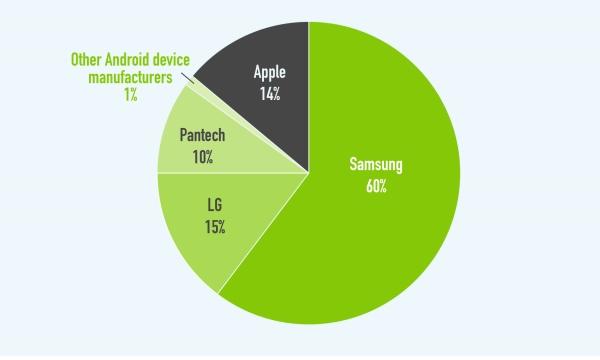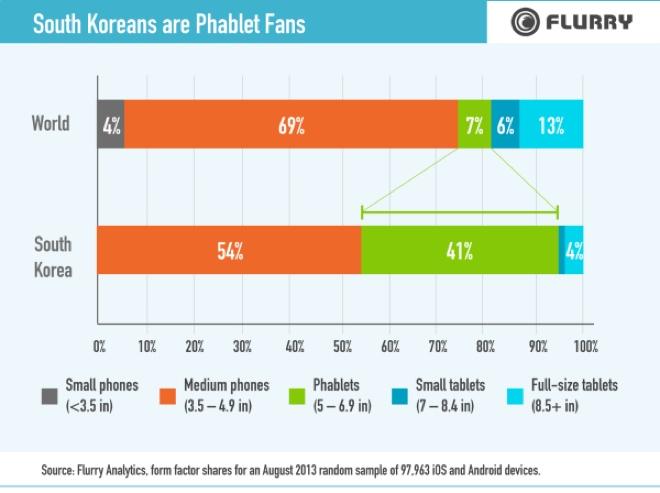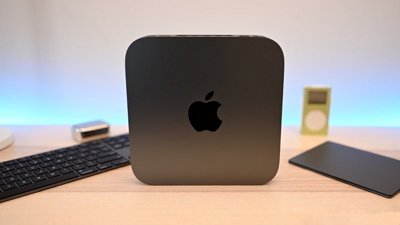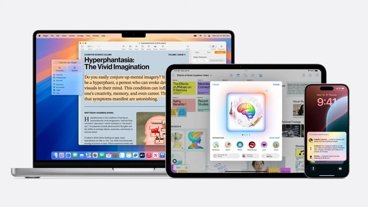Samsung has a decided home-field advantage in South Korea, but a new study looking at market share in that country shows that Apple's iOS accounts for roughly one out of every seven mobile devices even in its rival's backyard.
The newest figures out from mobile industry analyst firm Flurry's most recent look at the mobile device market in South Korea, one of the world's most tech savvy nations. Flurry found more than 33 million active smartphones and tablets in the country, and Apple's iOS platform was running on 14 percent of those.
Manufacturers based out of South Korea enjoyed the most success in that country, With chief Apple rival Samsung far and away the most preferred device maker in the country. Samsung held a 60 percent share of the South Korean mobile device market, according to Flurry, followed by LG, also based out of South Korea, with a 15 percent share. Pantech, another South Korean firm, came in behind Apple with just 10 percent of the South Korean market. All other Android manufacturers amounted to just one percent of the market.
The study also found that so-called phablets — larger-screened smartphones sized somewhere between a normal smartphone and a small tablet — are remarkably popular in South Korea. Whereas phablets make up only seven percent of mobile devices worldwide, they account for 41 percent of Android and iOS devices in South Korea. Phablets in that country are so popular that they appear to be depressing sales of tablets. Whereas Flurry sees tablets accounting for 13 percent of devices worldwide, they account for only five percent in South Korea.
Beyond South Korea, Flurry's new analysis seems to indicate that tablets are not a fad. The segment has grown from just two percent of the market six months ago to seven percent in the present. A number of analysts have recently speculated that Apple would soon enter the phablet segment, with the latest reports putting a larger iPhone device on the schedule for some time in 2014.
Samsung may have the home advantage in South Korea, but its products reportedly aren't as well loved by their owners as Apple's are. Apple has already topped Samsung in terms of customer satisfaction for the iPhone. Yet another survey on tablet satisfaction saw the iPad beating out Samsung and LG tablets for the third year in a row.
 Kevin Bostic
Kevin Bostic




-xl-m.jpg)



-m.jpg)






 Malcolm Owen
Malcolm Owen
 Chip Loder
Chip Loder
 Christine McKee
Christine McKee
 William Gallagher
William Gallagher
 Amber Neely
Amber Neely

 Andrew Orr
Andrew Orr


-m.jpg)






40 Comments
Duh. Not everyone can afford the best
I think instead of buying a tablet and a smartphone, they buy a phablet.
Maybe these tech savvy country also has mentality like those cheap-nerdy-tech-tards that bigger is better.. plus more hertz, cores, ram, open, get wow'ed on gimmick/unnecessary features, etc
Does Samsung account for 1 out of 7 smartphones in the US?
Does Samsung account for 1 out of 7 smartphones in the US?
They're doing much better then 1 out of 7 in the US. Roughly 1 out of 4 smartphones in the US are Samsung phones.
If one were to count the number of phones in the US with internal parts made by Samsung that number significantly increases.
Does Samsung account for 1 out of 7 smartphones in the US?
Samsung accounts for 24% of the U.S. smartphone market due to selling smartphones at so many different price-points. Samsung is certainly doing better here than Apple is doing in S.K. definitely because of lack of a phablet offering. I don't know the iPhone carrier situation in S.K. but I'm willing to bet Apple could sell a lot more iPhone 5s is they were available and Apple pushed sales a little harder. In S.K. they really seem to like large smartphones. Of course, I think it's admirable for the S.K. consumer to back their domestic brands because it shows loyalty to their country and local economy.